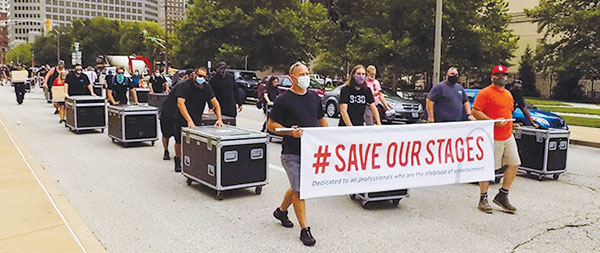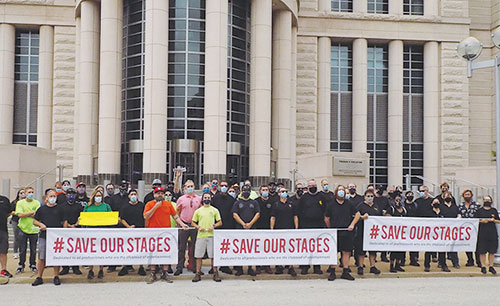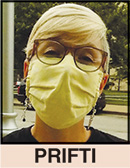By TIM ROWDEN
Managing Editor

They’re the first to come and the last to leave. Except in a pandemic.
The coronavirus pandemic has completely shut down the entertainment industry, canceling plays, concerts and conventions and shuttering live venues.
Entertainment venues were the first to close amid the COVID-19 coronavirus pandemic, and they will be the last to return.
Nearly 50,000 Missouri event workers have lost their payroll income due to COVID-19. Nationally, more than 12 million people work in the live arts, generating roughly a trillion dollars in economic activity every year. Singers, dancers, musicians and actors are the public faces of the industry, but they are only a fraction of the workers who depend on the performing arts to make a living.
Behind the scenes, making the magic happen, you will find Stagehands (IATSE Local 6), Musicians (AFM Local 2-197), Actors (SAG-AFTRA), Wardrobe Attendants (IATSE Local 805), Scenic Artists (USA 829), Decorators & Displaymen (IATSE Local 39), Projectionists (IATSE Local 143), Stage Directors and Choreographers (SDC), ushers ( IATSE Theatrical Employees Local B-2) and Ticket Sellers (IATSE Local 774) – all jobs that were sidelined when marques were darkened and ticket booths shuttered in response to the pandemic.

 “Since March, our industry has been decimated by COVID-19, since Day One,” said Michael Beckman, business manager for Stagehands Local 6. “We’re still out of work. We have 90 percent unemployment just with our members and over-hires. There’s not a lot of people talking about our industry. We’re calling on our elected officials to do something. We have men and women that are out of work who’ve been doing this their whole lives and they have no immediate future of going back to work.”
“Since March, our industry has been decimated by COVID-19, since Day One,” said Michael Beckman, business manager for Stagehands Local 6. “We’re still out of work. We have 90 percent unemployment just with our members and over-hires. There’s not a lot of people talking about our industry. We’re calling on our elected officials to do something. We have men and women that are out of work who’ve been doing this their whole lives and they have no immediate future of going back to work.”
To raise awareness and spur action on the part of lawmakers, on Sept. 1, a host of performance venues and other buildings in St. Louis were lit up in red as part of the nationwide Red Alert RESTART event.
The next day, on Sept. 2, event and entertainment workers took part in a “load-in” event in front of the Thomas F. Eagleton Federal Courthouse at 111 South 10th Street, where Senators Roy Blunt and Josh Hawley’s offices are located, to urge them to support passage of the RESTART Act (S.3184) to extend the Paycheck Protection Program for entertainment workers and the Save Our Stages Act (S.4258) to make grants available to live venue operators to help keep their venues from closing permanently, taking the jobs and economic activity they generate with them.
 ‘KNOCKED ALL OF US OUT’
‘KNOCKED ALL OF US OUT’
“We’ve been shut down since the first week of March,” said Matt Brannon, owner of the Casa Loma Ballroom. “I hire hundreds of bands – 200 bands a year. We have weddings, shows, trade shows, all kinds of things. We’ve been shut down and they won’t let us open up. This affects lighting, sound, caterers we have come in and provide food. It affects so many people.”
Mark Schilling, head electrician at the Fox Theater, said the shutdown has impacted not only the work he does at the Fox, but the other jobs he relies on to get him through the year.
 “I’ve been out of work not only at the Fox, but I also run a lighting rental company. That income went away along with everything else on March 12,” Schilling said. “The only other skill I’ve got is as a musician and I’m out of work on that side too. It’s pretty much knocked all of us out.”
“I’ve been out of work not only at the Fox, but I also run a lighting rental company. That income went away along with everything else on March 12,” Schilling said. “The only other skill I’ve got is as a musician and I’m out of work on that side too. It’s pretty much knocked all of us out.”
Schilling said he would like to see state and federal officials focus on rapid testing to allow the economy to reopen.
“Everybody could get tested every day and we could all go back to work,” he said.
SECONDARY JOBS AFFECTED
James Prifti, assistant production manager at the Muny, St. Louis’ popular outdoor theater venue in Forest Park, said the Muny has been able to transition to online virtual performances, but with a much smaller staff.
 “This is the first season in 102 years that the Muny has not had a live, in-person season,” she said. “We were able to transition to online, but that employed a very minimal number of our 600 people that we normally employ in the summertime.”
“This is the first season in 102 years that the Muny has not had a live, in-person season,” she said. “We were able to transition to online, but that employed a very minimal number of our 600 people that we normally employ in the summertime.”
For the majority of stagehands, concession stand workers, wardrobe and box offices employees, there simply is no work.
“There are hundreds of people that are and will continue to be out of work as long as everything is closed,” she said. “Not to mention the food delivery services that come and help us, the bus system that gets people to and from our theater, it just goes on and on. There are tons of secondary jobs that are affected.”
HOW YOU CAN HELP
There are several things you can do to help entertainment and event industry workers:
- Go to SaveOurStages.com and make a donation to the National Independent Venue Association.
- Email or tweet your representatives and urge them to support the RESTART Act and Save Our Stages Act
- Reach out to local theaters and ask what you can do to help.
“We’re going to be some of the last industries to reopen,” Prifti said. People are starving and they’re not able to pay their bills.”


